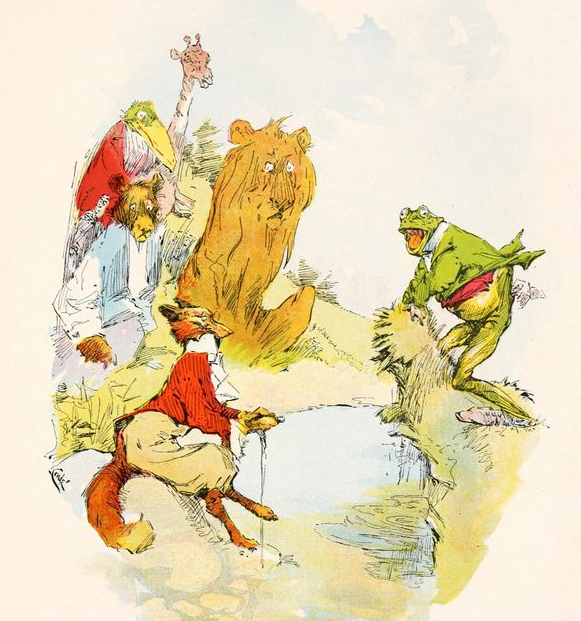οὐδείς ~ οὐδενός (adj. masc.): nobody, no one
ἕτερος ~ ἑτέρου (adj. masc.): other, another
ἄλλος ~ ἄλλου (adj. masc.): other, another
κακίων ~ κακίονος (adj. masc.): worse
χρηστός ~ χρηστοῦ (adj. masc.): useful, good
These are the proverbs (and there are always more proverbs at the blog):
Οὐδεὶς ἀγαθὸς εἰ μὴ εἷς ὁ θεός.
Τὸν ἕτερον πόδα ἐν τῃ σορῷ ἔχων.
Ἄλλων ἰατρός, αὐτὸς ἕλκεσιν βρύων.
Οἱ γὰρ κακοί, κακίους ἐπαινούμενοι.
Δίκαιος εἶναι μᾶλλον ἢ χρηστὸς θέλε.
And now, some commentary:

Aesop's fable of the fox and the frog
Οὐδεὶς ἀγαθὸς εἰ μὴ εἷς ὁ θεός.
No one is good except one, God.
The words are from the Gospel of Mark; it comes from a dialogue when someone has petitioned Jesus, addressing him as διδάσκαλε ἀγαθέ, "good teacher," and Jesus rebukes him with these words, saying that God alone is good. Notice the nice pairing of words which works the same in both Greek and English: οὐδ-εὶς, "no-one" and εἷς, "one."
Τὸν ἕτερον πόδα ἐν τῃ σορῷ ἔχων.
Having the other foot in the coffin.
In other words, one foot is still here among the living, but the other foot is already in the coffin; i.e. someone is as good as dead already. Compare the English saying, "having one foot in the grave." The phrase appears in Lucian, who marks it as proverbial with the word φασίν ("they say"): τὸν ἕτερον πόδα, φασίν, ἐν τῇ σορῷ ἔχων. Erasmus cites another variation on this saying, also from Lucian: τὸν ἕτερον πόδα ἐν τῷ πορθμείῳ ἔχοντα, "having the other foot already in the ferry-boat" (i.e. the ferry-boat of Charon, crossing the river Styx).
Ἄλλων ἰατρός, αὐτὸς ἕλκεσιν βρύων.
A doctor for others, himself covered with festering sores.
This is a "physician, heal thyself!" type of saying. Specifically, it is the punchline of an Aesop's fable in which the fox mocks the frog for claiming to be a doctor when the frog cannot cure his own skin disease. In some versions the fox mocks the frog not just for his skin but also for his hobbled way of walking, as you can see in these different English versions of the fable.
Οἱ γὰρ κακοί κακίους ἐπαινούμενοι.
Wicked people when praised become even more wicked.
The phrase comes from Philostratus's Life of Apollonius. A similar saying also appears in the so-called Sentences of Sextus, a Hellenistic collection of Greek aphorisms that was popular among Christian writers: κακοὶ κολακευόμενοι κακίους γίνονται, "the wicked, when flattered, become more wicked."
Δίκαιος εἶναι μᾶλλον ἢ χρηστὸς θέλε.
Strive to be righteous rather than useful.
Δίκαιος εἶναι μᾶλλον ἢ δοκεῖν θέλε.
Strive to be righteous rather than to seem (to be righteous).
This is one of the monostichs (one-liners) of Menander, and I am presenting it in two versions here because I am convinced that the second version, with δοκεῖν, is the correct version, even though it appears in none of the extant manuscripts. The usual version with χρηστὸς does not make a lot of sense, and it also has no elegance to it. The version with δοκεῖν is a more profound statement, contrasting being with seeming to be, and it also has a nice sound quality with δίκαιος ~ δοκεῖν. You can read an argument in defense of the emendation here: Further Thoughts on Menandri Sententiae by Vayos Liapis, who argues that χρηστὸς was originally a marginal gloss which then insinuated itself into the text itself, displacing δοκεῖν. So, the version you will find in all the modern editions of Menander does say "Δίκαιος εἶναι μᾶλλον ἢ χρηστὸς θέλε" — but I'm pretty sure if we could ask Menander he would say instead: Δίκαιος εἶναι μᾶλλον ἢ δοκεῖν θέλε.

Aesop's fable of the fox and the frog
And here's a random proverb too:
No comments:
Post a Comment